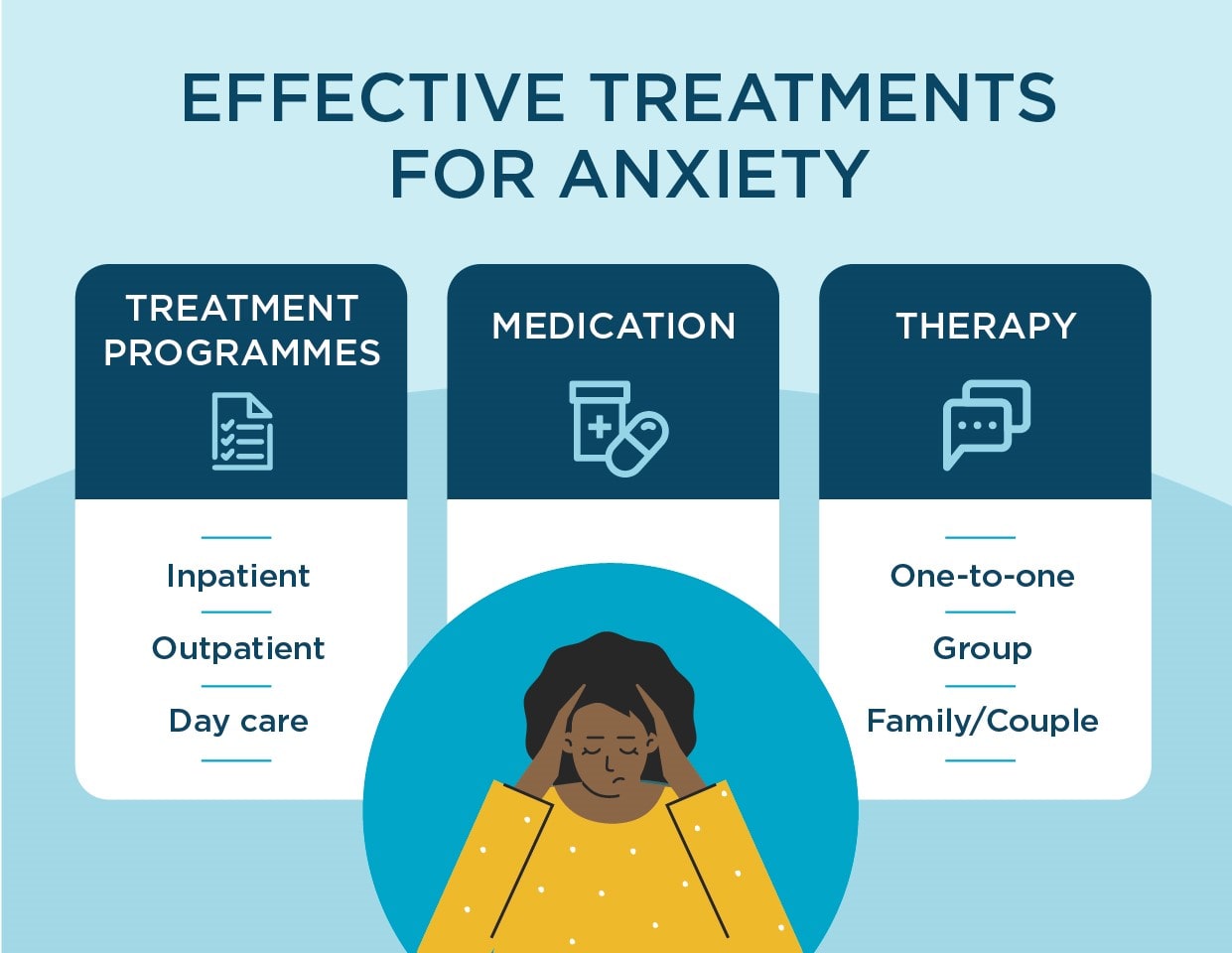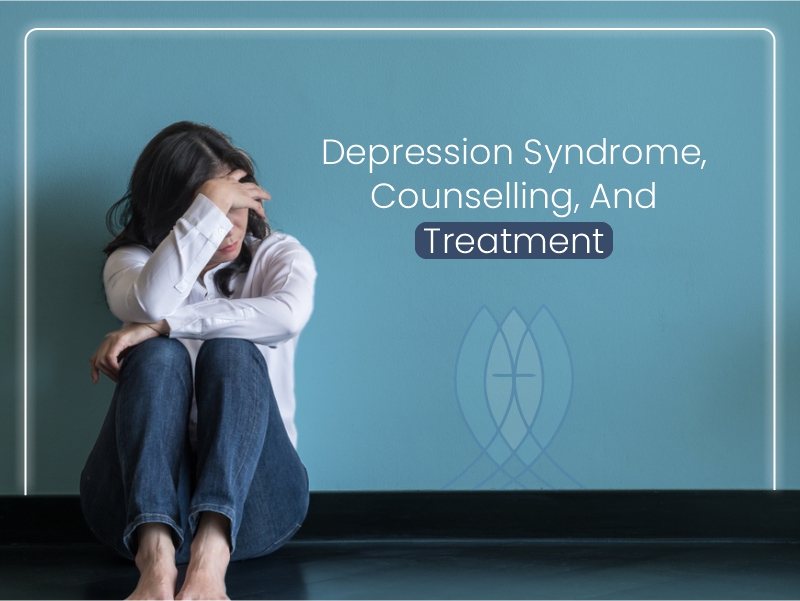Reclaim your peace of mind through therapeutic therapy for anxiety
Reclaim your peace of mind through therapeutic therapy for anxiety
Blog Article
Exploring Various Strategies in Counselling for Stress And Anxiety Problem for Enduring Change
When tackling anxiety disorders, it's necessary to check out a range of therapy methods. Each approach uses special insights and tools to help you handle your symptoms successfully. You could discover that combining strategies can yield the most effective outcomes. Nevertheless, recognizing the subtleties of these techniques is key to fostering lasting modification. What happens if the appropriate mix could launch a brand-new level of psychological health for you?
Understanding Stress And Anxiety Disorders: A Quick Introduction
Anxiety problems, which affect numerous people worldwide, can significantly impact day-to-day live. You could experience frustrating sensations of anxiety or worry that appear uncontrollable. These feelings can bring about physical signs like an auto racing heart, sweating, or perhaps lightheadedness. Common kinds of anxiousness conditions consist of generalized anxiousness disorder, panic attack, and social anxiety condition. Each has distinct indications, but they all share a tendency to interrupt your regular and relationships.Understanding the origin of your anxiousness is essential. It might originate from genetics, mind chemistry, or life experiences. Recognizing your triggers can help you handle your feedbacks much better. It's crucial to keep in mind that you're not the only one in this struggle. Several individuals face similar obstacles, and looking for aid is a strong step toward feeling better. By finding out about stress and anxiety conditions, you're currently on the course to understanding and handling your problem better.
Cognitive-Behavioral Therapy: Testing Negative Thought Patterns

Recognizing Negative Thought Triggers
Identifying the specific triggers behind your negative ideas can be vital in taking care of anxiousness when you experience moments of distress. Begin by taking notice of situations that provoke feelings of concern or worry. Is it a crowded room, a forthcoming due date, or a conversation with particular people? Jot down these circumstances in a journal. This will help you recognize patterns in your thinking. Likewise, notice physical experiences that accompany your adverse ideas, like an auto racing heart or rigidity in your upper body. By pinpointing these triggers, you get insight right into what's fueling your anxiousness. Comprehending these links is the very first step in testing those thoughts and inevitably reclaiming control over your psychological actions.

Replacing Ideas With Positives
Testing adverse thought patterns is a necessary step in transforming your way of thinking and lowering anxiety. You may typically discover yourself entraped in cycles of insecurity or disastrous reasoning. Rather than letting these ideas dictate your feelings, technique replacing them with positive affirmations or realistic alternatives. When you believe, "I can't handle this," shift it to, "I can take care of difficulties one step at a time." This easy change can significantly influence your emotional state. On a regular basis recognizing and countering these adverse thoughts helps develop a much healthier internal discussion. Remember, it requires time and initiative, but regularly practicing this technique can result in long lasting modification, empowering you to encounter stress and anxiety with restored confidence and durability
Structure Coping Techniques With Each Other
Replacing adverse ideas is only the start of taking care of stress and anxiety efficiently. To develop lasting modification, you need to develop coping methods that empower you. Cognitive-Behavioral Therapy (CBT) aids you identify and test those unhelpful idea patterns. With each other, you and your therapist can check out just how these thoughts influence your sensations and behaviors.Start by developing functional methods, like journaling or mindfulness workouts, that permit you to face anxiousness head-on. When you encounter your fears gradually, you'll discover to respond in different ways.

Mindfulness and Acceptance-Based Approaches: Cultivating Present-Moment Understanding
As you browse the intricacies of anxiety, including mindfulness and acceptance-based techniques can considerably boost your capacity to grow present-moment understanding. By concentrating on the below and currently, you'll find that you can observe your thoughts and feelings without judgment. This technique assists you recognize your anxiousness without feeling bewildered by it.Engaging in mindfulness exercises, such as deep breathing, body scans, or guided meditations, permits you to ground on your own in your present experience. Acceptance-based techniques encourage you to embrace your feelings instead of deal with versus them. When you approve your sensations, they shed their power over you.Incorporating these practices into your daily routine can transform exactly how you reply to stress and anxiety. You'll create durability and find out to browse stressful situations with higher ease. Inevitably, cultivating present-moment recognition lays the structure for long lasting change, encouraging you to lead an extra satisfying life.
Direct Exposure Treatment: Facing Anxieties Slowly
Direct exposure therapy aids you confront your anxieties in a progressive means, making it less frustrating. You'll learn methods to face anxiety-provoking circumstances detailed, while additionally developing coping strategies to manage your responses. This method encourages you to take control and decrease anxiousness in time.
Steady Exposure Techniques
When encountering anxiousness, slowly facing your anxieties can be a powerful way to reclaim control. This strategy, recognized as gradual exposure, includes gradually revealing yourself to the circumstances or items that cause your anxiety. Begin with much less daunting scenarios and slowly work your method approximately more tough ones. If you're scared of public speaking, you could begin by speaking in front of a mirror, then progress to sharing thoughts with a good friend, and eventually address a tiny group. Each action aids desensitize you to the fear, building your confidence with time. Bear in mind, it's vital to pace yourself and celebrate small success as you move via this site here process, strengthening your ability to manage anxiousness properly.
Structure Coping Approaches
Structure efficient coping methods is essential for handling stress and anxiety, especially as you confront your fears gradually. One powerful technique is exposure treatment, where you begin by encountering your worries in a controlled fashion. Begin with much less daunting situations and gradually work your way approximately more difficult circumstances. This gradual exposure helps desensitize you to anxiousness triggers, making them much less overwhelming.Incorporate leisure techniques, such as deep breathing or mindfulness, to calm your mind during exposure. Track your development, commemorating tiny triumphes in the process to increase your self-confidence. Keep in mind, it's all right to take your time; the goal isn't excellence but consistent improvement. By constructing these strategies, you'll equip on your own to navigate anxiousness and embrace life much more fully.
Psychodynamic Treatment: Discovering Source of Stress And Anxiety
Psychodynamic treatment explores the unconscious mind, exposing the origin causes of your anxiety - Counseling services for anxiety. By analyzing your thoughts, sensations, and previous experiences, this method aids you discover underlying problems and unresolved issues that may contribute to your existing anxiety. You'll deal with a therapist to check out childhood years experiences, relationships, and emotional patterns that shape your actions today.As you obtain insight right into these much deeper layers of your subconscious, you'll begin to acknowledge just how previous events influence your present habits. This understanding can bring about catharsis, allowing you to process emotions you may have suppressed.Through the therapeutic relationship, you can additionally determine defense mechanisms that might have established over time, using a clearer path to change. Ultimately, psychodynamic treatment furnishes you with the tools to resolve your stress and anxiety at its core, advertising long-term makeover in your emotional wellness
Integrative and Holistic Strategies: Integrating Techniques for Greater Efficiency
Incorporating various restorative techniques can boost your journey toward handling anxiousness a lot more effectively. By incorporating aspects from cognitive-behavioral therapy, mindfulness techniques, and alternative approaches, you can develop a customized strategy that resolves your special needs. For example, you could utilize cognitive-behavioral strategies to test adverse idea patterns while including mindfulness workouts to ground on your own in the present moment.Additionally, checking out holistic methods such as yoga exercise or reflection can promote relaxation and lower anxiousness signs and symptoms. This blend allows you to create better self-awareness and resilience.Experimenting with these diverse techniques can assist you uncover what reverberates most with you. Bear in mind, it has to do with discovering a harmony that functions, as opposed to sticking to a solitary method. This integrative approach not just supplies instant alleviation yet also cultivates lasting abilities for managing anxiousness, encouraging you to reclaim control over your life.
The Function of Support Systems: Building Strength Via Connection
While it could appear click to find out more that handling anxiety is a solitary journey, having a strong support group can play an essential role in your resilience. Surrounding yourself with understanding close friends, family, or assistance teams produces a secure area where you can openly share your sensations and experiences. When you get in touch with others, you advise on your own that you're not alone in this struggle.These partnerships provide support and can provide useful coping approaches that have actually benefited others. It's also a chance to gain perspective; friends can aid you see scenarios in different ways, lowering sensations of isolation.Moreover, psychological assistance promotes a feeling of belonging, which can greatly alleviate anxiety signs and symptoms. By leaning on your support group, you can construct strength and take on difficulties extra effectively. Remember, reaching out for help suggests strength, and it can make all the difference in your journey toward handling anxiousness.
Frequently Asked Inquiries
What Are the Common Signs And Symptoms of Anxiousness Conditions?
You might experience uneasyness, tiredness, difficulty concentrating, irritability, muscle tension, and sleep disruptions. Physical symptoms can include quick heartbeat, sweating, and trembling. Acknowledging these signs early can aid you seek appropriate support and therapy.

How Long Does Treatment Commonly Last for Anxiety Conditions?
Treatment for anxiety conditions commonly lasts anywhere from a couple of weeks to several months. It truly depends on your individual requirements, progress, and the techniques your therapist uses to help you manage your stress and anxiety properly.
Can Medication Be Used Alongside Therapy for Stress and anxiety?
Yes, drug can certainly be utilized alongside therapy read for anxiousness. Integrating both approaches commonly improves therapy effectiveness, aiding you manage signs while checking out underlying problems with counseling. Always consult your doctor for personalized advice.
Are There Self-Help Methods for Taking Care Of Stress And Anxiety?
Yes, there are several self-help approaches for managing anxiety. You can practice mindfulness, take part in routine workout, maintain a well balanced diet regimen, establish a routine, and make use of deep breathing strategies to assist lower anxiousness symptoms successfully.
Just how Do I Know if I Required Professional Aid for Anxiety?
You should consider looking for expert help for anxiousness if it interrupts every day life, triggers considerable distress, or if self-help methods aren't functioning. Depend on your impulses; getting to out can bring about far better coping abilities and support. Typical kinds of anxiety problems include generalised anxiousness condition, panic disorder, and social anxiety condition. When you encounter moments of distress, recognizing the details triggers behind your negative thoughts can be crucial in managing anxiousness. Changing adverse thoughts is only the start of managing anxiousness effectively. By analyzing your thoughts, sensations, and past experiences, this approach aids you uncover underlying conflicts and unresolved problems that might add to your present anxiousness. It's likewise a possibility to acquire viewpoint; good friends can aid you see circumstances in a different way, lowering feelings of isolation (Counseling services for anxiety).Moreover, psychological assistance fosters a feeling of belonging, which can substantially reduce anxiousness signs
Report this page